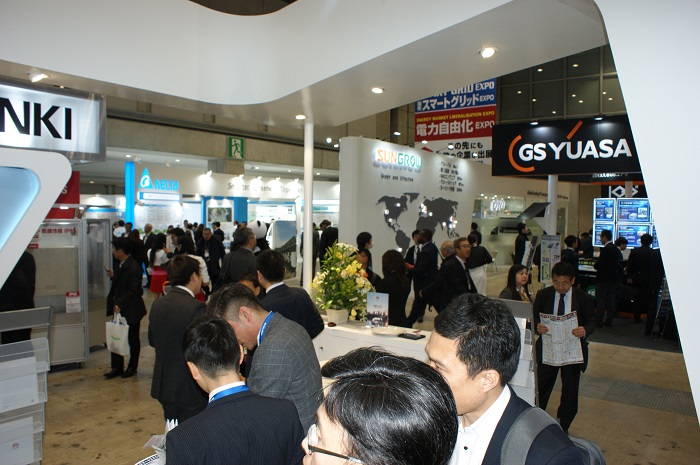The packed show floors of days two and three of the PV Expo in Tokyo were in stark contrast to the relatively subdued opening day, and perhaps a reflection of Japan’s reticence to rushing in.
Zero Energy Homes (ZEH) were ‘a thing’ at last year’s show: a government-approved way of building new homes that places emphasis on a lower carbon footprint, namely by becoming 20% more energy-efficient. The vagaries that shroud the hows and whens of ZEH remain, but there could be no denying the impact that this government-backed ‘plan’ is having.
Talk of ZEH opportunities was more prominent this year, particularly after the Ministry of Economy, Trade and Investment (METI) confirmed on the opening day that the FIT for residential-sized solar installations will fall from JPY 31-33/kWh ($.029/kWh) to JPY 21/kWh ($0.18/kWh). This cut had been widely anticipated, as evidenced by the sheer number of solar module and home energy management system (HEMS) solutions on display across the show floor.
Wuxi Suntech exhibited its ZEH solution bundle that comprises a hybrid lithium battery inverter (3-4kWh), control management system and either rooftop-mounted or BIPV modules. Suntech Japan president Zhan Gao told pv magazine that he expects this product to be introduced to the Japanese home market later this year.
“Because Suntech acquired Japanese BIPV specialist MSK Corporation in 2006, we are uniquely positioned to understand the needs of the typical Japanese homeowner, and can combine local knowledge and sales channels with Suntech’s renowned brand and quality,” Gao said.
IHS senior solar research manager Cormac Gilligan had earlier told pv magazine that while the ZEH program will be a boon for Japan’s residential market, foreign module suppliers especially could find it difficult to sell to the handful of leading homebuilders in Japan, given the strong market preference for domestic brands.
Popular content
GCL-Si president, overseas business unit, James Hu, understood these concerns, but spoke of his confidence that the Chinese company’s new G-Home system – comprising GCL solar modules and battery – is ideally suited for the demands of this growing section of the Japanese solar industry. Hu expects residential solar installations in Japan to rise to around 2 GW this year.
Germany’s SMA – a strong presence in both Japan’s megasolar and decentralized PV markets – is also increasing its activity in the Japanese residential PV sector. SMA Japan MD Takeshi Imazu told pv magazine that he expects C&I and residential PV to account for 70% of Japan’s market growth in the next few years, and revealed that SMA and Tigo are poised to roll-out their module-level power electronics (MLPE) solution in Japan very soon.
Canadian Solar president and CEO Shawn Qu also spoke in hopeful terms where residential growth is concerned, while Jolywood SVP for the high-efficiency cell division Liu Yong spoke of why the Chinese firm’s new n-type bifacial modules of 21% efficiency are finding a receptive audience in a Japanese market that continues to place keen emphasis on high-efficiency solar products.
Elsewhere, Trina Solar, JinkoSolar and Hanwha Q Cells were also promoting their high-efficiency options for the residential market, while inverter leaders Sungrow, Huawei and SolarEdge placed a keen emphasis on the equally-exciting commercial and industrial (C&I) rooftop space, which is also expected to benefit from METI’s Zero Energy Buildings (ZEB) initiative, which targets an expectation of half of all new commercial buildings built by 2020 to be zero-net energy.
pv magazine will provide a full and comprehensive review from the PV Expo show next week.
This content is protected by copyright and may not be reused. If you want to cooperate with us and would like to reuse some of our content, please contact: editors@pv-magazine.com.


By submitting this form you agree to pv magazine using your data for the purposes of publishing your comment.
Your personal data will only be disclosed or otherwise transmitted to third parties for the purposes of spam filtering or if this is necessary for technical maintenance of the website. Any other transfer to third parties will not take place unless this is justified on the basis of applicable data protection regulations or if pv magazine is legally obliged to do so.
You may revoke this consent at any time with effect for the future, in which case your personal data will be deleted immediately. Otherwise, your data will be deleted if pv magazine has processed your request or the purpose of data storage is fulfilled.
Further information on data privacy can be found in our Data Protection Policy.